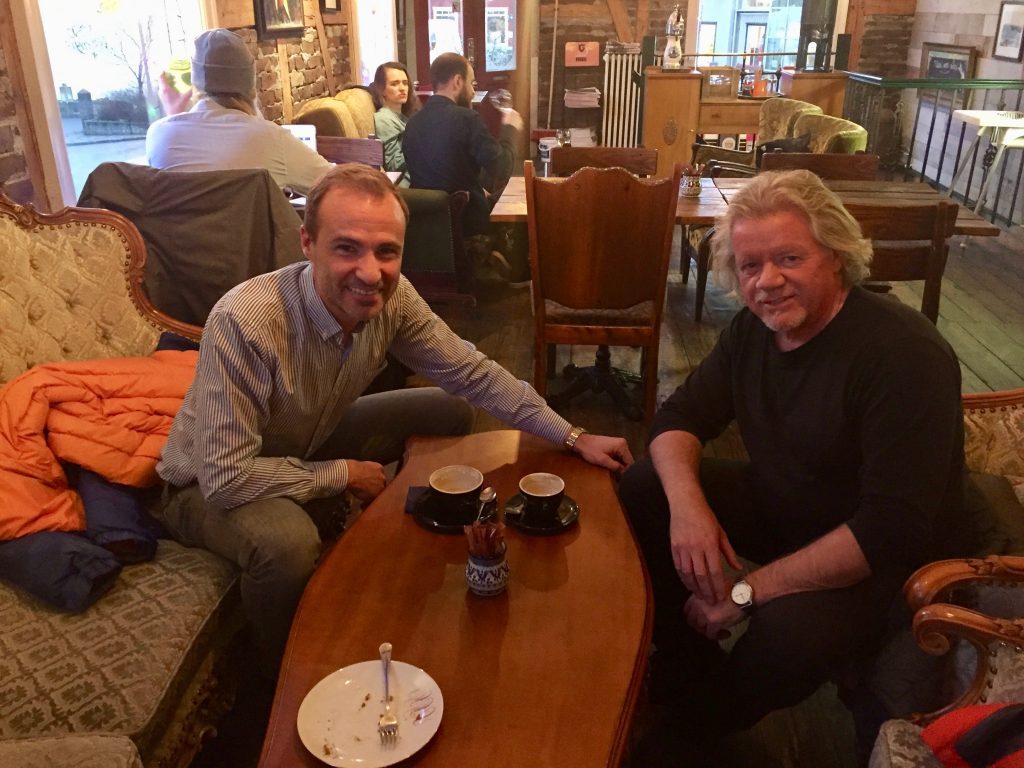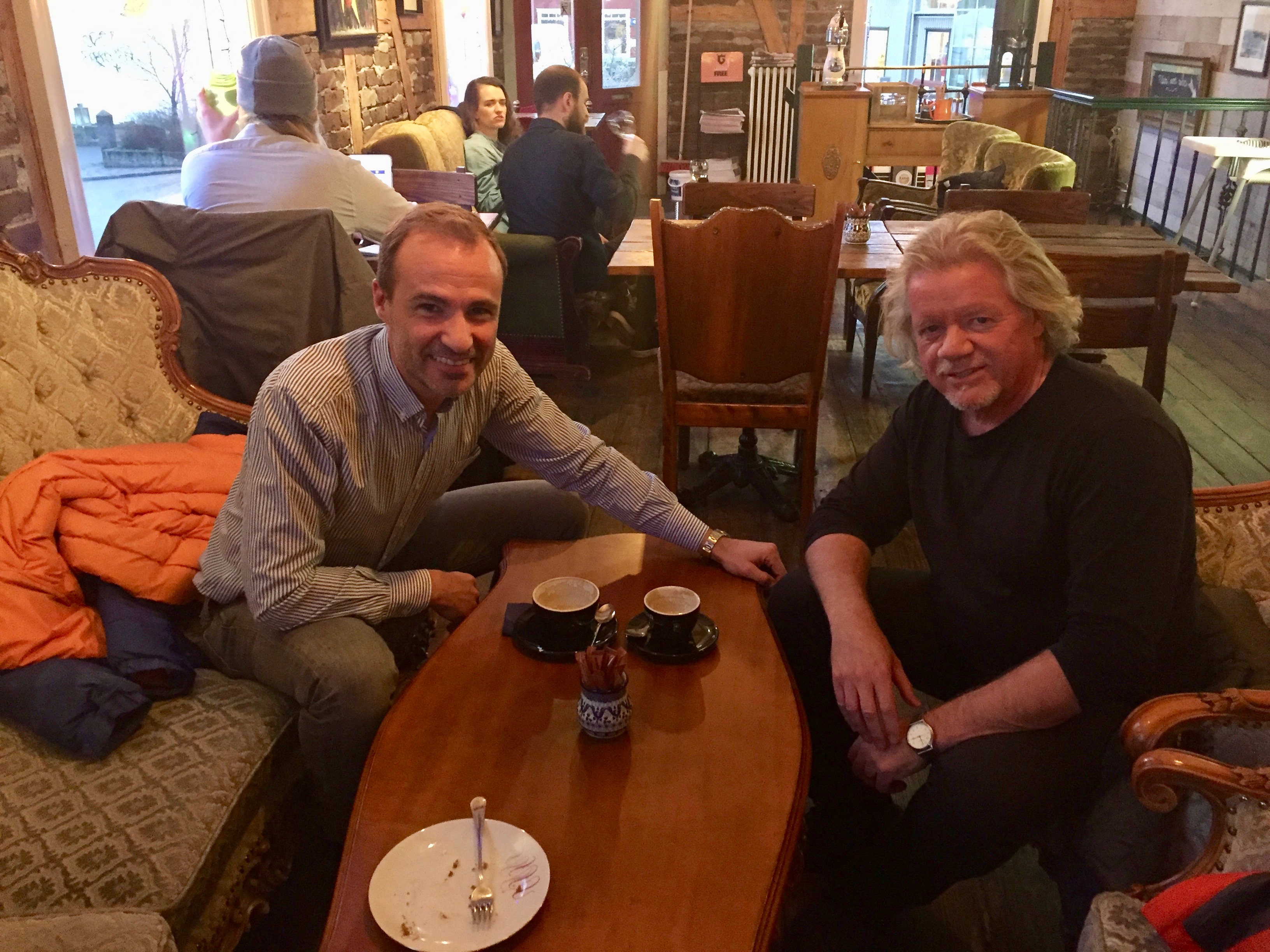Kristinn R Ólafsson interview by the Spanish writer in Iceland Jordi Pujolá, with the support of Icelandic Mountain Guides. 15 % discount day tours code ESCRITOR2019
Check out all you can do in Iceland, winter and summer
This article is part of my project La Contra Islandia that connects Icelandic and Spanish cultures
Read the full article in Spanish
Characteristics of Icelanders by Kristinn R Ólafsson
Tell me some characteristics of the Icelanders
«First, we are not punctual or foresighted
Second, we do not reply to e-mails or letters
Third, we always keep the resource of the Þetta reddast (the problem will be fixed by itself)
Fourth, here we are all cousins, so the plug-in works even better than in Spain»
And don´t miss:
- The 10 tips to go to Barcelona
- Summer 2018 article traditions Iceland
- How are the Icelanders? 10 things
- Interview in Morgunblaðið
- Second interview Morgunblaðið
- 10 top wines in Iceland Vínbúðin
- The Interview to Árni Þórarinsson
- Interview to Andri Snær Magnason
- The Interview to Hallgrímur Helgason
- Interview to Sjón
- The interview to Blaz Roca
- Interview to Halldór Már (guitar and showman in TV3)
- The interview to HAM
- Interview Agent Fresco
- Interview to Úlfur Úlfur
- The interview to JóiPé x Króli
- Úa publisher of Forlagið
- Óttar Norðfjörður interview
- Interview to Aron Can
- Baltasar Kormákur interview
- Mexico Guadalajara Book Fair
- Victor del Árbol writer
- Kim Manresa photographer
- Benedikt Erlingsson
- Carmen Posadas writer
- Börkur Gunnarsson writer
Icelanders and Spaniards like dirty jokes and talking badly of others
First of all, Kristinn R Ólafsson lived in Spain for more than 30 years
This native of the Vestman Islands or Vestamannaeyjar Islands who cites Cervantes accurately and has translated the Literature Nobel Prize Camilo José Cela considers himself as an hybrid of both cultures
Of course, here in Iceland everyone identifies him as the man who explained all the important things that happened in Spain on the radio

Kristinn R Ólafsson interview
Among other languages, he speaks a very good Spanish with gracefulness and a bunch of colloquial expressions
«When I arrived in Barcelona in 1974 to study Spanish at the University, I could only say yes, no and counting to five. Even though I went to bars more than at class, I learned quickly. I never asked for student loans, every summer I went back to Iceland to work»
Another feature of Kristinn is he sings while speaking like the old troubadours and not only when he is recording Egil Skalla-Grimsson´s Saga in Borgarnes museum, also here talking to me in Kaffi Stofan

Kristinn R Ólafsson interview in Kaffi Stofan
So we met in the cosy Kaffi Stofan, a house of wood and old Danish style. We sat on rickety sofas on the second floor overlooking the centre of Reykjavik
«In Barcelona I met a girl from Madrid and at the end of 1977 I moved to Madrid. We got married and I became a madrileño, totally integrated, but always connected to Iceland. To be two things at once is a good mix. I came back to Reykjavik in 2012″
Changing the subject, Kristinn and I have more things in common. He loves biking all the year round (even though he admits he is not biking as he used to since he moved to Kopavogur) and advised me to put studded tires on my bike
«You will go more safely with them than by foot.»
Hjólin snúast
Ruedan las ruedas pic.twitter.com/RGwIER06Ju— Kristinn R. Ólafsson (@KristinnR_) April 4, 2019

¿What does Kristinn R Ólafsson do to make a life?
Kristinn R Ólafsson interview
How do you start as a journalist in Madrid?
«Well, for very Icelandic things: a friend of mine knew the famous sports journalist Hemmi Gunn and, after the robbery to the Central Bank in Barcelona in 1981, RUV (Icelandic radio and television) called me to do a report of the Spanish press. Since then I started reporting all the important issues happening in Spain: the poisoning by rapeseed oil, the 1982 World Cup …

How are the Spaniards?
I know some Icelanders don´t like finding closed shops in the middle of the day because the siesta. However, I think la siesta is healthy and necessary if it´s too warm outside (as Camilo Jose Cela said: you do siesta with pyjamas and potty
On the other hand, I think Spain should adjust the timetable in order of making family life easier
The best way to meet an Icelandic is to get drunk with him
How are the Icelanders?
«In general, Icelanders are reserved, but also open and affable once the shell is broken. The best way to meet an Icelandic is to get drunk with him or her (laugh), although it is a very expensive way if done in a bar, because alcohol here is very expensive
Maybe the Icelandic label lacks something of that finesse that we could call urbanity. Cervantes wrote in his novel Los trabajos de Persiles y Sigimunda – a story on the northern islands, including Islanda, as he called it – that those islands had people, rustic and half barbarian, of little civility and hard and insolent hearts . And that lack of urbanity, perhaps, is still true here in Iceland. It is not that we are brutes, but the same language lacks of some mechanisms of urbanity … Those subtleties and social attitudes that are acquired in cities older than Reykjavik, if we can call Reykjavik a city»
When I returned to Iceland, there were behaviours that shocked me deeply
«For instance, in the elevator of my building nobody said anything. I couldn´t stand that tedious silence and I started saying hello or talking about the weather as in Spain and it worked out!
Today, it still happens to me that when I leave a store, I do not know exactly what to say. Then I say thank you or goodbye, but in Iceland the common thing is to French leave!» (laughs)

«Another example is something that happened to me a few years ago. I came in at a book store here in Reykjavik, and I held courteously the door for a man who was entering as well, but he didn´t say thank you nor even looked at me so I raised my fist with indignation and shouted: You say thank you! He looked at me like I was crazy» (more laughter)
What are you doing now?
«I clandestinely bought a book in Cuba (Trilogía sucia de la Habana by Pedro Juan Gutiérrez). I liked it so much that I decided to translate it into Icelandic on my own, because I thought it described very well the hard times in the 90s after the fall of the Soviet Union
It was very difficult to find a publisher (Sæmundur) because Iceland doesn´t have Dirty Realism background and the novel goes against the stream that is considered politically correct, with that accent in the machismo very characteristic of the Caribbean -precisely the author told me in Havana last November that he highlighted the Caribbean machismo to denounce it-. In addition, the work is full of very physical and smelly sexuality»
Here we only talk about fucking!
All in all, the book is having a good reception and the Morgunblaðið newspaper has scored it with four stars out of five
Now I am translating into Spanish, in collaboration with my daughter Alda Ólafsson Álvarez, a black novel called Snow Blindness by Ragnar Jónasson that is having great success in several countries. Seix Barral intends to publish it in Spain in the autumn, and will be the first in a series by the same author»
What Icelandic authors do you like?
- Icelanders: some books by Thór Vilhjálmsson such as Grámosinn glóir or Fljótt fljótt sagði fuglinn, a novel that I remember as full of that Mediterranean light that attracted me so much. Also several works by Halldór Laxness and some novels by Arnaldur Indridason. I also like Hallgrímur Helgason, Auður Jónsdóttir and my friend Árni Þórarinsson whom I had the honour and pleasure of translating into Spanish a few years ago, that is to say his black novel Dauði trúðsins

What Spanish authors do you like?
- In Spanish: those that I have translated La familia de Pascual Duarte and La colmena by Camilo José Cela. Also La tabla de flandes and El club Dumas by Arturo Pérez-Reverte. Also, I like some works by Antonio Muñoz Molina, Eduardo Mendoza, Rosa Montero, Javier Marias … As well as, for example, the Argentine Tomás Eloy Martínez, without forgetting the «friend of Iceland» Jorge Luis Borges … And, of course, Cervantes, because I still love El Quijote, from which I stole some phrases or words when I translated into Spanish my little novel Fjölmóðs saga föðurbetrungs that came out in RBA with the title The saga of Fiólmod the Intrepid, originally written in a sort of ancient Icelandic and therefore I had to look for something similar in Spanish
Kristinn R Ólafsson interview is another article by the Spanish writer Jordi Pujolá
